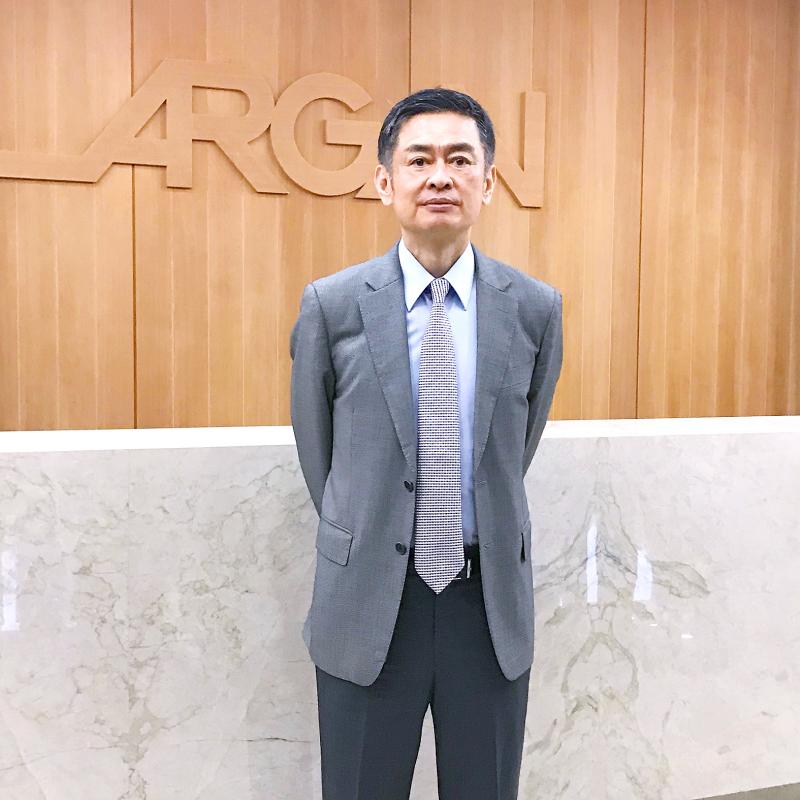Largan Precision Co (大立光), the nation’s leading camera lens manufacturer, saw its gross margin slide to 65.6 percent last quarter, from 68.6 percent a quarter earlier, after a major client canceled its orders, chief executive officer Adam Lin (林恩平) said yesterday.
“The client directly canceled all of its orders last month, which lowered our gross margin, as the client had requested high-specification orders with higher profit margin,” Lin told investors at an online earnings conference.
Lin did not name the client, while market speculation was that it was Chinese telecom equipment provider Huawei Technologies Co (華為), whose manufacturing has been disrupted by a US’ ban, demanding suppliers to stop shipping to Huawei if their products contain US technology.

Photo: Chen Mei-ying, Taipei Times
Largan has been talking with other clients to inquire if they are interested in placing more orders, but it would be “highly unlikely” that any new orders would be large enough to fill in for the allocations that were previously saved for the client, Lin said.
As a result, there is a chance that the firm’s capacity utilization rate would drop in the fourth quarter, Lin said.
The firm, which provides lenses for Apple Inc’s iPhone as well as Android phone vendors such as Samsung Electronics Co, declined to reveal how much Huawei’s orders had contributed to its previous revenue reports.
Lin expected the firm’s shipping momentum, which depends on the sales performance of its clients, to remain flat this month from last month, he said.
“Although our clients often update their forecast, there is still a high uncertainty, as it is unpredictable how their new mobile phones will sell,” Lin said.
The third-quarter gross margin of 65.6 percent was the lowest after 64.24 percent recorded in the first quarter last year, company data showed.
Largan would continue focusing on high-end lenses for premium smartphones, Lin said.
Many handset vendors increasingly favor mid-range and low-end smartphones, which has increased pressure on the firm to compete with other lens suppliers, he said.
“There is a figure for gross margin in my mind, and we will not accept orders with gross margins lower than that, although I cannot tell you how high this number is,” Lin said to investors.
Largan’s third-quarter net income plunged 30 percent year-on-year to NT$5.86 billion (US$202.31 million), due to an unfavorable product portfolio and foreign exchange losses of NT$710 million with the New Taiwan dollar strengthening against the US dollar, Lin said.
Its earnings per share were NT$43.74 in the third quarter, while in the first three quarters they totaled NT$131.
Although Largan’s stock price has dropped to a relatively low level, the company has no plan to buy back its shares, Lin said.

In Italy’s storied gold-making hubs, jewelers are reworking their designs to trim gold content as they race to blunt the effect of record prices and appeal to shoppers watching their budgets. Gold prices hit a record high on Thursday, surging near US$5,600 an ounce, more than double a year ago as geopolitical concerns and jitters over trade pushed investors toward the safe-haven asset. The rally is putting undue pressure on small artisans as they face mounting demands from customers, including international brands, to produce cheaper items, from signature pieces to wedding rings, according to interviews with four independent jewelers in Italy’s main

Japanese Prime Minister Sanae Takaichi has talked up the benefits of a weaker yen in a campaign speech, adopting a tone at odds with her finance ministry, which has refused to rule out any options to counter excessive foreign exchange volatility. Takaichi later softened her stance, saying she did not have a preference for the yen’s direction. “People say the weak yen is bad right now, but for export industries, it’s a major opportunity,” Takaichi said on Saturday at a rally for Liberal Democratic Party candidate Daishiro Yamagiwa in Kanagawa Prefecture ahead of a snap election on Sunday. “Whether it’s selling food or

CONCERNS: Tech companies investing in AI businesses that purchase their products have raised questions among investors that they are artificially propping up demand Nvidia Corp chief executive officer Jensen Huang (黃仁勳) on Saturday said that the company would be participating in OpenAI’s latest funding round, describing it as potentially “the largest investment we’ve ever made.” “We will invest a great deal of money,” Huang told reporters while visiting Taipei. “I believe in OpenAI. The work that they do is incredible. They’re one of the most consequential companies of our time.” Huang did not say exactly how much Nvidia might contribute, but described the investment as “huge.” “Let Sam announce how much he’s going to raise — it’s for him to decide,” Huang said, referring to OpenAI

Nvidia Corp’s negotiations to invest as much as US$100 billion in OpenAI have broken down, the Wall Street Journal (WSJ) reported, exposing a potential rift between two of the most powerful companies in the artificial intelligence (AI) industry. The discussions stalled after some inside Nvidia expressed concerns about the transaction, the WSJ reported, citing unidentified people familiar with the deliberations. OpenAI makes the popular chatbot ChatGPT, while Nvidia dominates the market for AI processors that help develop such software. The companies announced the agreement in September last year, saying at the time that they had signed a letter of intent for a strategic